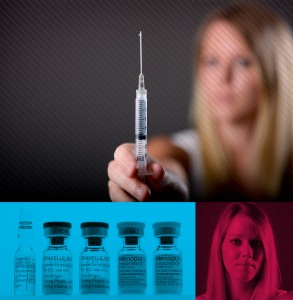Inspired to act by childhood loss, a young reporter became an egg donor. In this way, she helped a couple have a baby. She also learned tough lessons about a donor’s worth once her contract is fulfilled.
 I have always been the wimp in my family, the first to cry or complain at any sign of pain or discomfort.
I have always been the wimp in my family, the first to cry or complain at any sign of pain or discomfort.
My parents and younger brother have taken great pleasure in reenacting all my greatest “near-death” experiences and illnesses at the dinner table over the years. Like the time I fell off the back of a golf cart and was convinced I’d broken my collar bone. (I didn’t.)
Or the time I thought I had meningitis. (It was just a cold.)
So the idea of donating eggs – injecting myself with hormones and undergoing an invasive surgery, all for someone else to have a baby — seemed a little far-fetched to my family.
A couple who lived half a world away plucked me out of an online library of hundreds of women who were willing to donate their sex cells to strangers. Each of us had been broken down by our general attributes. My specifications, a fertility agency would later tell me, were desirable: 25 years old, green eyes, 5-feet, 10-inches tall, blond hair, a 3.6 university grade point average and a burgeoning new career.
Those same specifications are what make my parents beam with pride.
One night last summer at my parent’s dinner table, I told my mom and dad that I wanted to help somebody have a baby. The usual lively suppertime conversation and laughter died down, and my parents lost their appetites. They didn’t want to joke about that time I drove my brother’s four-wheeler into a tree anymore.
I told them I am like the thousands of other women — the daughters, sisters, girlfriends or wives at someone else’s dinner table — who donate their eggs to couples who cannot conceive a child on their own.

With an estimated 7.3 million people experiencing infertility in the United States, or one out of eight couples, the demand for young women like me who voluntarily undergo hormone drug treatment and egg retrieval surgery is high. And with the average compensation for this kind of donation at about $5,000 in Florida, the allure of this relatively new medical procedure is attracting more and more young women, despite the many unknowns.
The eggs in my ovaries made me valuable. Without them, there is no in vitro fertilization, no surrogate mothers, no baby making business. As it unfolded, I began to feel like a commodity rather than a human being, a means to an end on the infant assembly line.